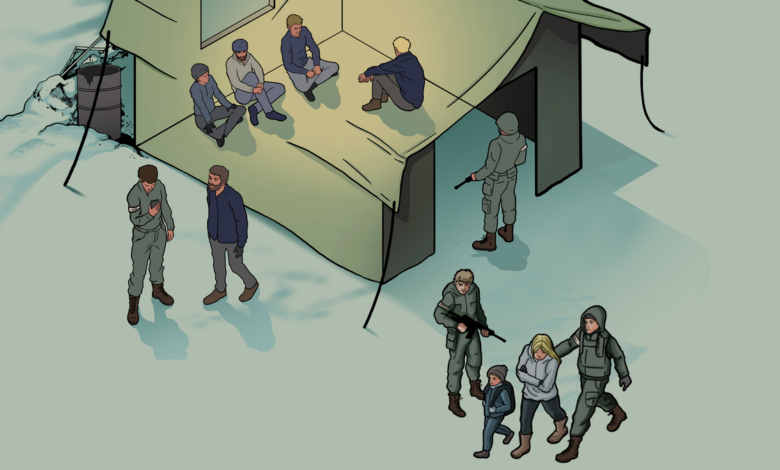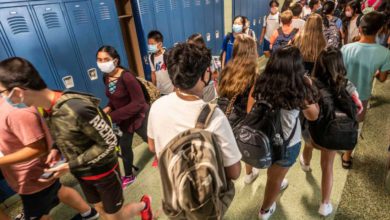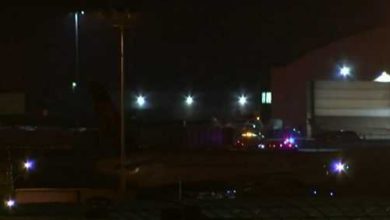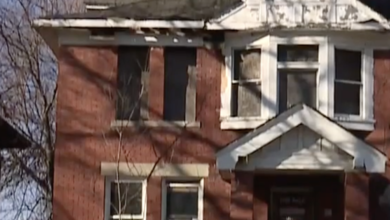
Your country has been invaded, and your home has been destroyed. You manage to escape and survive in the basement of a nearby building. Then, one day, there’s a strange voice outside. Soldiers force you out of your shelter and you are directed to a bus, destination unknown. The miles blur beneath the wheels, and at every stop, you are photographed, searched and questioned. Eventually, you are left to fend for yourself in the country that destroyed your home and killed your neighbors. This is the story of Russia's deportation of Ukrainians.
International authorities agree the scope of Russian deportations is vast. The United States estimated that as many as 1.6 million people have been deported. Ukraine’s president placed the number at 2 million. One human rights organization says the total could be 4.7 million. The deportees may include hundreds of thousands of children, and the international criminal court in The Hague has issued an arrest warrant for Russian President Vladimir Putin for these alleged forced deportations.
Some Ukrainians were forced to move into Russian-occupied territory in Ukraine. Others were taken into Russia and, in some cases, placed in camps far on the other side of the country. Each case may be a war crime: Human Rights Watch says unlawful displacement can be by force, or by “fear of violence, duress, detention, psychological oppression or abuse of power.” The group has documented cases of Ukrainians forced out of their homes in Kharkiv and in Mariupol, the city that was under siege for 10 weeks before falling to Russian control in May 2022. Other groups have observed deportations from Kherson and Zaporizhzhia.
For this report, USA TODAY interviewed Ukrainians who were deported and others who were in close contact with deported relatives in 2022. Vlad’s family was taken from the basement in Mariupol. Illya went through the Russian screening known as “filtration.” Natalia tried to keep tabs on her mother, Olena, who was moved deep inside Russia. To protect themselves and their relatives and friends inside Russia, all asked to be identified only by their first names. This story also relies on accounts documented by Human Rights Watch, Amnesty International, the Conflict Observatory and Ukraine 5AM Coalition.
Each deportee’s experience is unique. Taken together, theirs is a story of fear, of Ukrainian people who – during an invasion that has now lasted for more than 450 days – were taken into Russian territory by force, coercion, against their will, or because they had no other option.
As fighting intensified across Ukraine, many people hoped to flee. But some did not have the means to do so, and for others, there was no way out. People fleeing to less risky parts of Ukraine were stopped by Russian forces. Some hoping to escape the war zone felt they had no way to survive aside from accepting a ride to Russia.

Ariana Torrey, USA TODAY
In some cases, Russian soldiers stopped people on the streets and searched for people in shelters, forcing them to come out of their hiding places.

Ariana Torrey, USA TODAY
People were separated from their families in chaotic scenes. Vlad said his grandmother was put on a tank and his mother on a bus. "Everyone tried to find their families. We asked what would happen to us, and we were told that they would take us to our families, but they didn’t know when." As Vlad ran to another bus, he saw burned-out cars, impact craters and rubble.

Ariana Torrey, USA TODAY
When Vlad boarded the bus, he didn't know where they were headed. Many people only agreed to leave because they feared consequences such as violence, duress, or detention if they stayed. Human Rights Watch and Amnesty International consider this type of forcible transfer a war crime.

Ariana Torrey, USA TODAY
The buses often drove for hours, sometimes for hundreds of miles. Vlad said he saw homes with broken windows and walls riddled with holes. He saw rocket launchers, tanks, and tracks from heavy machinery. All of the buildings were dark and many were burning. The place they slept was loud and overwhelming: He could hear gunfire and planes flying overhead and saw contrails streaking across the sky.

Ariana Torrey, USA TODAY
FILTRATION CAMPSThe first stop for many was a checkpoint in a Russia-controlled city within Ukraine. In some cases, people would be subjected to multiple stops and checkpoints. These makeshift filtration centers would often be set up in tents, government buildings and police stations.

Ariana Torrey, USA TODAY
Illya told us that his family was forced to undress in freezing conditions. They were checked for gunpowder residue, bruises from firing weapons, injuries and pro-Ukrainian tattoos.

Ariana Torrey, USA TODAY
Many arrived exhausted, disoriented and afraid, with the few possessions they could grab and shove into bags and often no home to return to. Vlad said he was only able to grab food and documents from his destroyed apartment. They waited in lines for hours for their turn.

Ariana Torrey, USA TODAY
For Illya, the second stage was another tent. Soldiers or police officers checked fingerprints there and took photos of everyone.

Ariana Torrey, USA TODAY
Ukrainians were forced to fill out forms and were interrogated. Illya told us that he was asked these questions:
Do you have relatives in the military?What’s your attitude toward politics?Toward the authorities?

Ariana Torrey, USA TODAY
Some people were forced into holding areas with no idea if or when they would be released or why they were being detained. Russian soldiers used physical force against civilians, sometimes resulting in death, according to Ukraine 5 AM Coalition.

Ariana Torrey, USA TODAY
For Illya, the last stage was a cellphone search. Soldiers looked through everything: deleted photos, browser history, messaging apps and more.

Ariana Torrey, USA TODAY
Little is known about what happened to those who failed filtration.

Ariana Torrey, USA TODAY
Those who passed were given migration cards and taken to Russia, though they did not always know where they would end up. In at least some cases, the deported were sent to isolated areas in Russia's far eastern regions. For example, 300 residents of Mariupol were taken to a city Russian city more than 6,000 miles away – a distance more than twice the width of the U.S.

Ariana Torrey, USA TODAY
ARRIVAL IN RUSSIAUkrainians have described arriving at Russian “placement centers” at sports complexes and schools. Vlad says there were several hundred people at his location. As they arrived, he said, they felt vulnerable and didn’t know what to expect.

Ariana Torrey, USA TODAY
Some people have described being processed by Russian investigators who questioned them and forced them to sign documents stating that Ukrainian soldiers committed war crimes. Some say they were pressured to apply for Russian citizenship. Ukrainians can receive payments of about $130, but deportees say there is little support beyond that.

Ariana Torrey, USA TODAY
Vlad told us that this was the first time his group was able to shower, talk to their family and find out what was happening in Ukraine. He said that they mostly ate and slept.

Ariana Torrey, USA TODAY
Some Ukrainians were placed in summer camps. The camps Vlad and Olena were taken to were isolated and far from cities. Natalia said that to get medication, her mother needed to take a taxi to the nearest city. Deportees are moved from one place to another, often with no say in where they ended up. Often, they don't have money and can't contact relatives or get legal advice about what to do next.

Ariana Torrey, USA TODAY
Ukrainians who wanted to leave Russia said they were given almost no support to do so. Some don't have any identity documents that confirm Ukrainian citizenship, making it harder to leave Russia. Those with no money had to seek the help of informal volunteer networks. It's extremely difficult for children, old people and people with disabilities to leave. Natalia said she worries about the Russian propaganda her mother now absorbs.
Even those who were able to leave Russia are often at a loss about what to do next: their home in Ukraine may have been destroyed, and they may have lost their possessions and jobs. Many don't know where to go or what to do. Some have family members who are still in Russia and couldn’t leave because of poor health or the lack of documents.
So in the end, some find themselves forced apart not just once, but twice. First, fleeing Ukraine amid a war, then attempting to leave Russia, and sometimes leaving their relatives behind.
The information in the story is based on interviews USA TODAY conducted with Ukrainians who went through this deportation process or knew family members who did. It also relies on reports from Human Rights Watch, Amnesty International and Ukraine 5 AM Coalition, a group of nongovernmental organizations documenting possible war crimes. The information about filtration is based on these accounts and a report from the Conflict Observatory, a program supported by the U.S. State Department in collaboration with researchers from Yale University. All accounts describe events that happened in 2022.
Shawn J. Sullivan and Josh Susong contributed to this report.
Published
Updated
Source link









